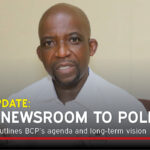Local statutory and commercial banks breaking rules
The Banking Supervision Report has raised a number of concerns regarding the operations of the country’s three statutory banks.
Statutory banks are those that have been formed through an Act of Parliament.
Currently these include: National Development Bank (NBD), Botswana Savings Bank (BSB) and Botswana Building Society Limited (BBSL).
The report, published annually by Bank of Botswana (BoB), presents information on regulation and supervision, as well as the structure and performance of the banking sector.
In 2018, BoB notes that it carried out a full-scope on-site examination of one of Botswana’s statutory banks, although the institution’s identity was not disclosed.
The examination comprised a review of capital adequacy, asset quality, management and effectiveness of board oversight, earnings and profitability, liquidity and sensitivity to market risk.
The findings revealed that the bank’s financial condition was unsatisfactory.
Numerous other problems were documented, including the bank’s operational risk environment, which was also labelled‘unsatisfactory’, as evidenced by an increasing staff turnover, especially in management.
Further inadequacies included the lack of a succession plan for critical roles, inability of the core banking system to integrate with other systems and a weak internal-control environment.
Furthermore the bank’s money laundering and financing of terrorism risk-management framework was also found wanting.
The report observed that the bank’s customers were not assessed for vulnerability to money laundering and financing of terrorism risks, customer due diligence procedures and controls were ineffective and identification and reporting of suspicious transactions were not carried out.
During the past year, the central bank also conducted on-site inspections at three commercial banks.
The examination focused on areas like credit risk, assessment of the board and senior management oversight, asset quality and operational risk.
In the first inspection, the examination revealed that the bank’s financial condition was unsatisfactory.
Deficiencies relating to board and senior management oversight were also noted.
This related to the absence of board charter, no training or induction for new board members, lack of board assessment, no succession plan and the appointment of the Managing Director by the parent bank without involvement by the local board.
At the second bank, while the financial position was found to be in good condition, it was, however, established that there were weaknesses relating to governance.
Identified issues included inadequate composition of the board and some board sub-committees and failure to conduct performance evaluation for board members.
It was further determined that the bank’s information technology security was compromised as the IT policy did not specify the frequency of penetration tests.
At the third bank, one of the troubles identified was violation of the Banking Act by not reporting some large credit exposures to the Bank on a quarterly basis.
Email: Kabelo@thevoicebw.com
Twitter: @Kabelo_Adamson

















